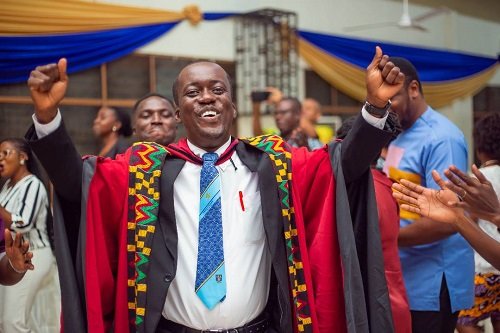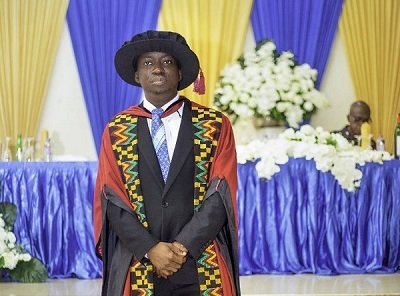Hot!
Dr. Peter Twum-Barimah… First PhD holder in Music in Accra Catholic Archdiocese

• Dr. Peter Twum-Barimah
According to Warren Young, Musicians’ brains are wired differently than non-musicians. Also, studying music from a young age gives musicians an intense internal desire to keep growing and improving as a musician.
Guided by the above statements from celebrated Musicians, Dr Peter Twum-Barimah who was born into a Catholic family, and had both parents who were into music, becomes the first person in Catholic Archdiocese of Accra, to be awarded a Doctor of Philosophy (PhD) in music, and the first person to receive a PhD in his family by dint of hard work, dedication and perseverance.
At a tender age of nine, young Peter developed interest in music and had his first electronic keyboard from the United Kingdom and began music lessons at the Saint Theresa Preparatory School – North Kaneshie, during his school days. He took music lessons from Mr. Peter Nii Dan-Okine and transferred his knowledge unto the piano.

His love for music is traced to his father, John Twum-Barimah, who played drums in church at the St. Marouns’ Church, Osu-Re and his mother, Celestina Twum– Barimah, a soprano singer of both the Singing Ministry of the Catholic Charismatic Renewal and a chorister at the St. Bakhita choir, Amasaman -Accra.
“The operative word of music is play. You get to play music with other people, and you get to play music by yourself. It’s a great refuge from the world sometimes and it’s a great way of putting a smile on someone else’s face.”
“We didn’t have television at home. We had music and we had the piano. I don’t think there was ever a point growing up where I said to myself ‘I love music,’ but when I was four or five years old, I thought, ‘Hey if I just bang on those keys it makes an interesting noise,’ he recalled.
At the time he was completing Junior Secondary School in 2001 now Junior High School, his love for the piano became so strong that he had begun playing in public, especially at family gatherings and at Youth Mass and Service at the Christ the King Catholic Church – Cantonments in Accra.
From there, he proceeded to the Saint Martin’s Secondary School, now Saint Martin’s Senior High School and studied Music as part of his Electives in the General Arts class and sat for the Senior Secondary Certificate of Education (SSCE) now the West African Senior School Certificate Examination (WASSCE) and passed.
Having obtained good grades, the celebrated Dr. Twum-Barimah advanced to the Methodist University College, Ghana in 2005 to read the Church Music Certificate Programme and after completion in 2006 the desire to explore his passion for music was now starting.
The easy-going music enthusiast continued to Ghana’s premiere University (University of Ghana, Legon) to read a Bachelor of Fine Arts Degree (Music, Dance and Theatre Studies).
After successful completion of his programme, Peter passed all examinations, where he was awarded a First Class Honours in Music with Theatre Arts in 2012 (he was the only single major music student graduating that year).
All along his musical education, Dr. Twum-Barimah has been playing the piano at Catholic Archdiocesan events and other high-profile programmes related to the Catholic Church in Ghana. In pursuant to drink deep, he enrolled in his second degree at the University of Ghana, which awarded him a Master of Philosophy Degree in Music (MPHIL-Music).
His interest in music was getting stronger and was much appreciated by his audience during his performance(s). During his MPhil Music studies, he was invited by one Abednego Botwe (Director of Music, Christ Anglican Church, University of Ghana, Legon) to assist in playing their new church organ. Peter took this humble assignment judiciously and has performed extensively especially with regards to concerts with the Christ Church Choir on many occasions till date.
Dr. Twum-Barimah following the changing trends in the music industry and the quest to drink deeper knowledge in his music passion, enrolled in the new four-year Music PhD structure of the University of Ghana in 2017. He was relentless till he completed all required examinations was subsequently awarded a Doctor of Philosophy in Music Degree.
Dr. Twum-Barimah’s area of specialization is music theory and composition, and he has interest also in choral works, analytical studies and hopes to branch into the area of church music in the future.
His aspirations are to encourage both prospective students and students to admonish the studying of music as a divine call and to embrace it whole-heartedly, to assist music directors who need help in running their choirs with his experience in the field of choral music and music education, and lastly to train a lot of church organists and directors to enhance the liturgy with good music.
Dr. Twum-Barimah takes inspiration from composers such as; George Frederick Handel, Wolfgang Amadeus Mozart, Josef Haydn, Dr. Ephraim Amu, Kenn Kafui and Anthony Kobina Yebuah.
Currently, he is the Principal Organist and Deputy Music Director of the Holy Spirit Cathedral, Adabraka – Accra- Ghana and Co-Music Director of the Christ Anglican Church – University of Ghana, Legon, Accra -Ghana.
He is a consultant in choral music and music theory and the teaching of piano. He is a faculty member at the Department of Music, University of Ghana – Legon and aims to promote good music whenever he is called upon.
He advises the youth especially those who wish to enter the music industry irrespective of the ensemble or musical institution to be humble and respectful and persevere in life to achieve their dreams.
He expressed special appreciation to Ambassador Isaac Osei & Mrs. Marian Osei, Pastor Mrs. Lamptey, Pastor Stephen Gabbah, the Very Rev. Fr. Dr. John Kobina Louis, Mr. Anthony Kobina Yebuah, Mr. Michael Morant Ezan, Dr. (Mrs.) Mary Anane-Mensah, Lieutenant-General Peter Augustine Blay, Professor Joshua Alfred Amuah, Professor John Franklyn Wiredu, the Holy Spirit Cathedral Patrons Council, the Holy Spirit and Christ Church Choirs, the Maestros Catholicam and the Faculty of the Department of Music- University of Ghana – Legon” and many other who had contributed in diverse way to his education.
By Innocent Samuel Appiah
Hot!
Four ‘Pragya’ Operators fined GH¢ 2,400 for obstructing public road at Agbogbloshie

Four tricycle operators, popularly known as ‘Pragya’, have been prosecuted and fined GH¢600 each equivalent to 50 penalty units by the Accra Metropolitan Assembly (AMA) Sanitation Court for obstructing public roads at the Agbogbloshie Market.
The offenders, who were arrested by Public Health Officers of the AMA during a routine enforcement exercise, pleaded guilty to the offence and were subsequently convicted by the court.
The four operators were among the 21 offenders recently arrested at the Agbogbloshie Market for various sanitation and public order violations, including selling on open drains, obstructing walkways, and trading at unauthorised locations.
Speaking after the court proceedings, the Head of Public Health at the AMA, Madam Florence Kuukyi, said the court was lenient with the offenders since it was their first appearance, hence the fine, and warned that subsequent offenders would face stiffer penalties, including imprisonment.
Hot!
Police arrest suspect in Taxi driver murders in Accra

The Ghana Police Service has arrested a man believed to be behind a series of robberies and killings of taxi drivers in the Greater Accra Region.
According to a statement from the Criminal Investigation Department (CID), the suspect, Peter Akakpo, also known as “Dompe,” was arrested on October 13, 2025, at Kasoa-Domeabra.
Police say he is an ex-convict and is believed to have worked with another suspect, Vincent Gbetorglo, who was arrested earlier on June 30, 2025.
The arrests follow investigations into the deaths of two taxi drivers at Sakaman Blue Lagoon on May 9 and June 15, 2025. Police say the suspects contacted the victims before the attacks.
The Anti-Armed Robbery Unit of the CID led the investigation, using intelligence and surveillance to track down the suspects.
Police say efforts are being made to recover the vehicles of the murdered drivers.
The CID assured the public that investigations are still ongoing and promised to provide updates as new information emerges.
By: Jacob Aggrey

 Profile7 days ago
Profile7 days agoAlbert Litela Obidiaba: The artist who wove Ghana’s soul into the King’s Baton

 News7 days ago
News7 days agoDaddy Lumba’s wife, children run to court to injunct December 6 funeral arrangements

 News1 week ago
News1 week agoPresident Mahama to meet Auditor-General, Chief Justice and Attorney-General over misuse of public funds






